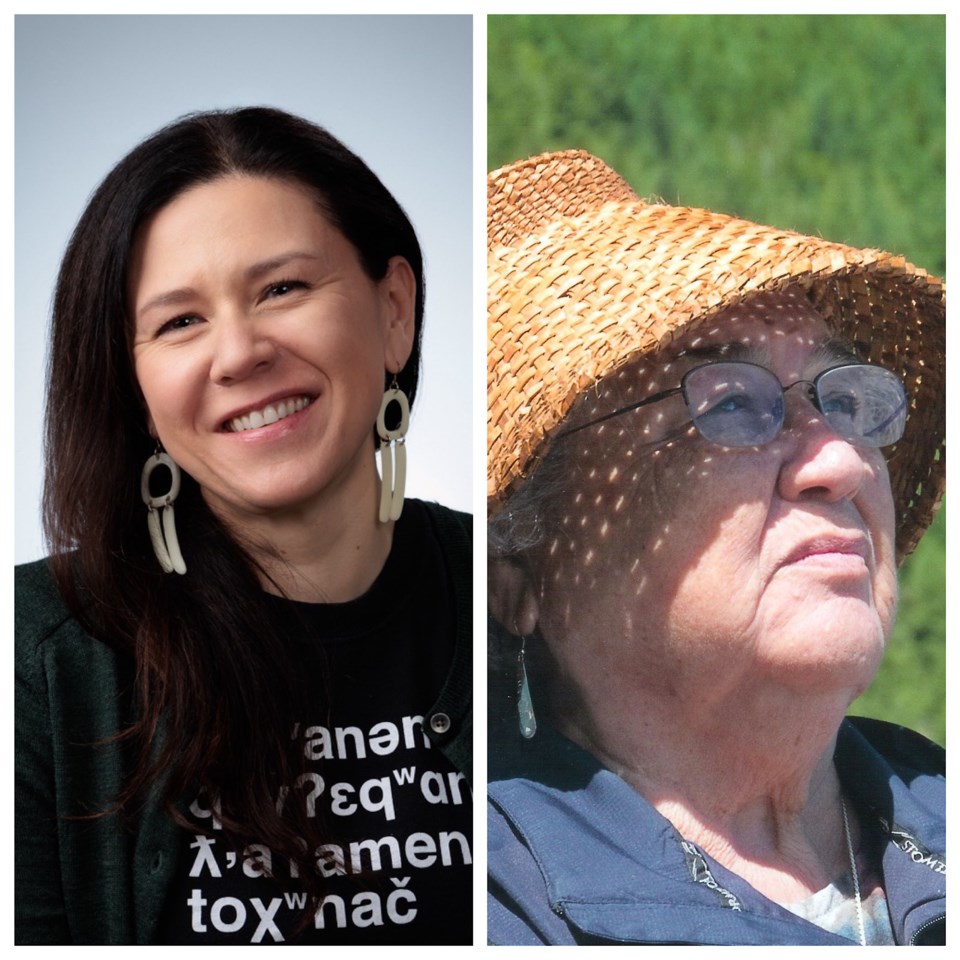According to the United Nations, Indigenous languages around the world are under threat. The threat is the direct consequence of colonial practices that resulted in the decimation of Indigenous peoples, their cultures and languages.
However, due to the work of Indigenous elders, educators and linguists, many of these languages are being taught to younger generations, with pride.
Tla'amin Nation elder Elsie Paul is one of the last mother-tongue speakers of the Tla'amin language, and with the help of her granddaughter Harmony sɛƛakəs Johnson (with Davis McKenzie, and Paige Raibmon), plus immense support from the Tla'amin community, the book As I Remember It: Teachings (ʔəms tɑʔɑw) from the Life of a Sliammon Elder was published in 2014.
"The positive thing is [with the hard copy], you can look at it and touch it and feel it," said Johnson, Paul's granddaughter and vice-president of Indigenous Wellness and Reconciliation for Providence Health Care. "We're socialized to think about writing a book a certain way, but it's a certain type of accomplishment. It was really important to my grandmother that she had a hard copy book."
The digital edition, published by RavenSpace, went live in 2019 and catapulted Paul's traditional knowledge to the next generation in an engaging and innovative format. It is up for an award in May.
Earlier this year, The American Council of Learned Societies (ACLS) announced finalists for the 2024 ACLS Open Access Book Prizes and Arcadia Open Access Publishing Awards. As I Remember It: Teachings (ʔəms tɑʔɑw) from the Life of a Sliammon Elder, by Paul with McKenzie, Raibmon and Johnson, is one of the five finalists in the history, multimodal, born-digital category. The winners will be announced May 2 at the 2024 ACLS general meeting in Baltimore.
"I was really shocked [about being a finalist]. This has obviously been a project we've worked on together for a long time," said Johnson. "Working on this book was tremendously meaningful and the coolest thing I've ever worked on."
One of the unique aspects of the digital publication is that the audience can hear the ayajuthem language being spoken. Johnson grew up in Tla'amin territory and has strong ties to Tishosum, and she was able to make recordings of elders speaking the endangered language.
"With this immersive online publication, readers can learn about the Tla'amin language, listen to Elsie tell her stories, and watch short animations of legends and events. They can navigate by theme – Colonialism, Community, Territory, Wellness – explore the contents through interactive maps, browse the audio and visual galleries or make use of the instructional materials designed for teachers and students," stated RavenSpace.
Paul stresses the importance of tɑʔɑw, the traditional teachings.
“We can see more, we can hear her voice, we can hear the language being spoken [in the digital version],” said Johnson. "We can look at the places and interact differently with the material."
The book has been used by many educators and Johnson said she used it when she was teaching a master’s-level program at University of British Columbia.
"A lot of people have used it for different reasons, and have been very inspired for different purposes,” she added. “We were able to use this amazing platform, without compromising our sacred knowledge."
Johnson believes that getting the language and traditional knowledge out there to the world and to the younger Tla'amin generation is an urgent matter, “to hear her [Paul] speak the language and to see her face when she's speaking.”
"We've got to instill pride, because [Tla'amin] people were taught to be embarrassed of our language and taught that it was inappropriate to be speaking the language,” she added. “That's really what contributed to a lot of language loss and, obviously, people being banned from speaking it in schools and families not passing it on.”
Tla'amin has been working for decades doing linguistic work in the community and in schools.
"It's really important for us to be able to speak this beautiful language, and it's part of our job for it to be learned, despite all of that interference for so long," said Johnson. "In many ways this [publication] democratizes language and culture, because many of our people don't live in Tishosum; and so they can't be around it every day; they can't hear the sound of it being spoken, they can't see the places."
The five finalists in the history, multimodal, born-digital category vary widely and include the titles: Cut/Copy/Paste: Fragments from the History of Bookwork by Whitney Trettien; i used to love to dream by A.D. Carson; Shadow Plays: Virtual Realities in an Analog World by Massimo Riva; and Vidding: A History by Francesca Coppa.
"This shows that Indigenous knowledge isn't some sort of relic of the past, and that this is today's work, and meaningful today," said Johnson. "The work we did on this book is leading the world in terms of digital publications."
ACLS applauded the authors and publishers of “these exceptional books,” through a statement from its president, Joy Connolly: “They’ve shown a commitment to making their scholarship available freely to the world, sharing their insights into the human experience with fellow scholars and communities worldwide.”
Join the Peak’s email list for the top headlines right in your inbox Monday to Friday.



